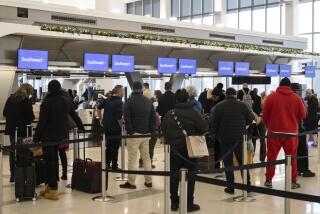Talks Up in Air Over Deal to Share Passenger Data
- Share via
WASHINGTON — U.S. officials expressed confidence Saturday that talks with the European Union on the sharing of airline passenger data were headed toward a successful conclusion, shortly after an EU spokesman said negotiations had broken down.
The conflicting statements came on the day of a court-imposed deadline to formalize the sharing of passenger data, a practice adopted after the Sept. 11, 2001, terrorist attacks. In May, the European Court of Justice struck down the arrangement because of legal and privacy considerations.
Lacking an accord, airlines potentially face legal action from individual European nations for providing personal information sought by U.S. security agencies, such as names, addresses, telephone numbers, itineraries and credit card numbers.
The sharply different characterizations of the Brussels-based negotiations led to confusion, with Europeans suggesting travel chaos could ensue and Americans downplaying concerns.
“The talks have broken down.... There is no agreement on passenger name data,” European Commission spokesman Jonathan Todd said. “The Americans put additional demands on the table this morning which went beyond the mandate of European negotiators.”
As of midnight in Europe, a “legal vacuum” would exist, he said.
EU officials have said that the lack of an agreement could disrupt air traffic on heavily trafficked transatlantic routes.
Some observers say an impasse could also mean that airlines risk U.S. sanctions if they do not provide data but European sanctions -- or an assortment of legal actions by the EU’s 25 member states -- if they do.
“This would be a highly undesirable situation, which could lead to certain legal chaos,” European justice spokesman Friso Roscam Abbing recently told Reuters.
After the Europeans’ characterizations, U.S. officials tried to ease concerns, maintaining that flights would continue.
“As we await the final ratification of the draft agreement, we expect that planes will continue to fly uninterrupted and our national security will not be impeded,” Homeland Security Secretary Michael Chertoff said in a statement.
“Importantly, the proposal ensures the appropriate security information will be exchanged and counterterrorism information collected by the department will be shared, as necessary, with other federal counter-terrorism agencies.”
Some European critics of a 2004 data-sharing deal worried that government officials might use such information for purposes unrelated to national security.
Negotiators have discussed safeguards for personal data: Reportedly, Europeans have sought more limitations on data use, whereas the United States has sought to keep simple the sharing of data among security agencies.
Despite misgivings, European officials have spoken favorably about sharing data and have said they want an agreement. They reaffirmed that view after authorities this summer reported disrupting a terrorist plot aimed at transatlantic flights leaving the United Kingdom.
“We were 90% there when the talks broke down,” the EU’s Todd said.
Chertoff said in his statement that continued sharing of passenger information remained an important antiterrorism tool and that cooperation with Europe was crucial.
“The recently uncovered terror plot concerning flights from the United Kingdom to the United States is evidence that terrorists continue to target our aviation industry, specifically U.S.-bound flights from Europe,” Chertoff said.
“Free and open information sharing between the United States and Europe has proven to be a valuable weapon to combat terrorists before they can do harm. The transfer of [passenger] data by air carriers to our department is an absolute necessity to safeguarding air travel and public security.”
jonathan.peterson@
latimes.com
Reuters news service contributed to this report.
More to Read
Sign up for Essential California
The most important California stories and recommendations in your inbox every morning.
You may occasionally receive promotional content from the Los Angeles Times.













